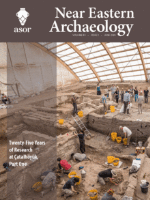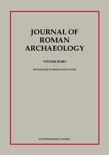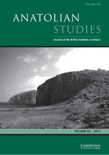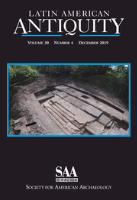
Cartagine-Studi e Ricerche
metrics 2024
Connecting scholars to reshape our understanding of history.
Introduction
Cartagine-Studi e Ricerche is a distinguished academic journal published by UNIV STUDI CAGLIARI, dedicated to advancing the fields of Archaeology, Classics, and History. With an Open Access format since its inception in 2016, this journal ensures that scholarly research is freely available to a global audience, fostering knowledge dissemination and collaboration among researchers, professionals, and students. Based in Italy, it occupies a vital place in the academic community, holding a Q3 ranking in each of its categories for 2023, showcasing its relevance and impact in the disciplines it covers. Scopus rankings further validate its quality, with impressive percentiles reflecting its significant contributions to the landscape of arts and humanities. Spanning converged years from 2019 to 2024, Cartagine-Studi e Ricerche serves as a crucial resource for those engaged in the study of ancient cultures and historical contexts, inviting innovative research and critical discussions that shape our understanding of the past.
Metrics 2024
 0.11
0.11 0.10
0.10 0.20
0.20 3
3Metrics History
Rank 2024
Scopus
JCI (Web Of Science)
Quartile History
Similar Journals

Vestnik Drevnei Istorii-Journal of Ancient History
Connecting Archaeology, Classics, and HistoryVestnik Drevnei Istorii - Journal of Ancient History, published by the esteemed Russian Academy of Sciences and the State Academy of Humanities (GAUGN), plays a pivotal role in the interdisciplinary field of ancient studies. Fostering scholarly discourse since 2016, this journal is positioned at the crossroads of archaeology, classics, history, and linguistics, as evidenced by its impressive 2023 ranking in multiple categories, including Q1 in Classics and Q2 in History. Although not open access, it serves as a critical resource for researchers, professionals, and students interested in deepening their understanding of ancient societies and cultures. With a reputation for rigor and a commitment to advancing knowledge, the journal aims to disseminate innovative research that sheds light on the complexities of ancient civilizations and their contributions to contemporary society. Current issues and a wealth of archived articles are available for exploration, fostering a rich environment for scholarly engagement.

Gerion-Revista de Historia Antigua
Unveiling the Secrets of the PastGerion-Revista de Historia Antigua is a prestigious academic journal published by UNIV COMPLUTENSE MADRID, SERVICIO PUBLICACIONES. Since its inception in 1983, this Open Access journal has been a vital platform for researchers and scholars in the fields of Archaeology, History, and Classics. Based in Madrid, Spain, the journal promotes rigorous scholarship and dissemination of knowledge covering a broad spectrum of ancient history and artifacts. With its impressive quartile rankings—Q1 in Classics and Q2 in both History and Archaeology—Gerion demonstrates a strong commitment to academic excellence, boasting a respectable presence within Scopus rankings. Researchers will find a collaborative space here, as the journal aims to support interdisciplinary dialogue and foster a deeper understanding of ancient civilizations. With its dedicated approach to quality and accessibility, Gerion is essential for anyone engaged in the study of our historical past, making it a valuable resource for students, professionals, and academics alike.

Spal
Elevating Scholarship in Archaeology and History.Spal is a distinguished academic journal dedicated to the fields of Archaeology and History, published by the University of Seville, Editorial. With an ISSN of 1133-4525 and an E-ISSN of 2255-3924, it has established a prominent reputation within the scholarly community, currently enjoying an impressive Q1 ranking in Archeology (Arts and Humanities) and History, alongside a Q2 ranking in Archeology for 2023. The journal serves as a critical platform for researchers, professionals, and students alike, promoting the dissemination of cutting-edge research and innovative methodologies in these vital disciplines. Spal's Scopus Ranks place it in the 84th percentile for Arts and Humanities - History and the 72nd for Archeology within the field, emphasizing its impact and relevance in contemporary scholarship. Although it operates under a traditional access model, its commitment to advancing knowledge and discourse in archaeological and historical studies remains unwavering. The journal's coverage spans from 2015 to 2024, positioning it well to contribute to ongoing academic conversations and foster collaborations within the global research community.

NEAR EASTERN ARCHAEOLOGY
Advancing Knowledge Through Archaeological DiscoveryNEAR EASTERN ARCHAEOLOGY, published by University of Chicago Press, is a premier journal dedicated to the field of archaeology, particularly focusing on the rich cultural heritage and archaeological findings of the Near East. With an ISSN of 1094-2076 and an E-ISSN of 2325-5404, this esteemed publication provides a vital platform for scholars and practitioners to share their research, insights, and discoveries. The journal holds an impressive ranking in the Q1 quartile for both Archaeology and History in 2023, reflecting its significant impact within these fields and a robust history of scholarly contribution. The journal has been pivotal in shaping discussions around archaeological methodology, theory, and contemporary issues from 2002 to 2024, as it continues to reach a wide audience through various access options. With Scopus rankings placing it in the top percentiles for both History and Archaeology, NEAR EASTERN ARCHAEOLOGY represents an essential resource for researchers, professionals, and students alike, fostering the exploration and understanding of the region's archaeological narrative.

PHOENIX-THE JOURNAL OF THE CLASSICAL ASSOCIATION OF CANADA
Reviving the Wisdom of the AncientsPHOENIX - THE JOURNAL OF THE CLASSICAL ASSOCIATION OF CANADA is a distinguished academic journal published by the Classical Association of Canada, dedicated to advancing the study of classical antiquity and its enduring influence on contemporary society. With an ISSN of 0031-8299 and an E-ISSN of 1929-4883, PHOENIX serves as a pivotal platform for researchers, educators, and students in the field of classics. Although without open access provisions, the journal is noted for its rigorous peer-review process, ensuring the publication of high-quality scholarship that meets the academic community's standards. With its back issues archived since 2002, the journal is supported by a strong reputation, evidenced by its Scopus ranking in the 80th percentile in the Arts and Humanities - Classics category. Based in Toronto, Ontario, it continues to foster scholarly dialogue and exploration of themes ranging from ancient texts to contemporary interpretations of classical traditions. By prioritizing diverse contributions that enhance our understanding of classical studies, PHOENIX remains a vital resource for anyone engaged in the rich and varied exploration of the ancient world.

Journal of Roman Archaeology
Connecting Disciplines: Where Archaeology Meets the ArtsJournal of Roman Archaeology is a premier academic journal published by CAMBRIDGE UNIVERSITY PRESS, dedicated to advancing knowledge in the fields of archaeology, classics, and visual arts. With its established reputation since 2005, the journal occupies a significant place in the scholarly community, featured in the Q1 quartile in both Classics and Visual Arts & Performing Arts categories, as well as Q2 and Q3 in Archaeology, reflecting its high impact and relevance. The journal not only presents rigorous research but also fosters interdisciplinary dialogue among researchers, professionals, and students across related fields. Although it does not operate under an open access model, it provides essential insights and critical analyses that contribute to understanding Roman archaeological practices and artifacts. With an ISSN of 1047-7594 and an E-ISSN of 2331-5709, the Journal of Roman Archaeology is an indispensable resource for anyone engaged in the exploration of ancient cultures, heritage preservation, and archaeological methodologies.

Veleia
Advancing Scholarly Discourse in Archaeology and the ArtsVeleia is a distinguished academic journal published by the Universidad del País Vasco, specifically from the Department of History, Art, and Music. This journal serves as a vital platform for the dissemination of scholarly research in the fields of history and archaeology, with a particular focus on the cultural and historical narratives of the Basque region and beyond. With a commitment to academic rigor, Veleia facilitates the exchange of innovative ideas and methodologies among researchers, professionals, and students alike. Although currently not open access, the journal aims to contribute significantly to its field by promoting interdisciplinary dialogue and fostering a deeper understanding of historical contexts. By publishing high-quality, peer-reviewed articles, Veleia plays a crucial role in advancing the academic discourse surrounding history and the arts in contemporary scholarship.

Anatolian Studies
Connecting Past and Present Through Scholarly InquiryAnatolian Studies, published by Cambridge University Press, stands as a premier forum for research in the fields of archaeology, cultural studies, and history. Established in 1951, this esteemed journal has consistently contributed to the academic discourse surrounding the rich and multifaceted history of Anatolia, earning its place in the Q1 category across multiple disciplines. With a notable impact factor reflected in its Scopus rankings, it ranks among the top journals in its fields: 78th in History, 155th in Cultural Studies, and 55th in Archaeology, showcasing its significant influence and recognition. This journal serves as an invaluable resource for researchers and scholars seeking to delve into the intricacies of Anatolian heritage, providing a platform for innovative research and critical discussion within the academic community. While it currently does not offer open access, Anatolian Studies continues to enrich scholarly resources and advance knowledge within its key areas of focus.

LATIN AMERICAN ANTIQUITY
Advancing Knowledge in Latin American Archaeology and HistoryLATIN AMERICAN ANTIQUITY is a prestigious journal published by Cambridge University Press, focusing on the archaeology and history of Latin America. With an impressive impact factor reflecting its critical role in the academic community, this journal exemplifies excellence in research, landing in Q1 across multiple categories, including Archaeology and History, as per the 2023 category quartiles. The journal's scope covers a broad range of topics related to pre-Columbian cultures, ancient civilizations, and historical developments, making it essential reading for researchers, professionals, and students keen on exploring the rich tapestry of Latin American heritage. Although it is not an open-access publication, LATIN AMERICAN ANTIQUITY remains a vital resource for those dedicated to advancing knowledge in this dynamic field. With its commitment to scholarly rigor and a strong ranking in Scopus, it serves as a cornerstone for academic dialogue and investigation.

Ancient Asia-Journal of the Society of South Asian Archaeology
Unlocking the Secrets of History Through Open Access ResearchAncient Asia - Journal of the Society of South Asian Archaeology, published by ARF India, stands as a pivotal resource for the exploration and dissemination of archaeological research focused on the rich history and culture of South Asia. Since its inception as an Open Access journal in 2006, it has become an essential platform for scholars and enthusiasts alike, boasting an impressive range of quartile rankings across multiple disciplines, including Anthropology, Archaeology, History, and Visual Arts. With expansion into various indexed categories and consistent dissemination of impactful research common to this highly diverse field, Ancient Asia aims to foster interdisciplinary dialogue, facilitate collaboration among researchers, and enhance the global understanding of ancient civilizations within the region. By embracing an inclusive access model, the journal encourages wide readership and engagement, positioning itself as a key player for students, professionals, and academics interested in delving into the archaeological marvels of South Asia.